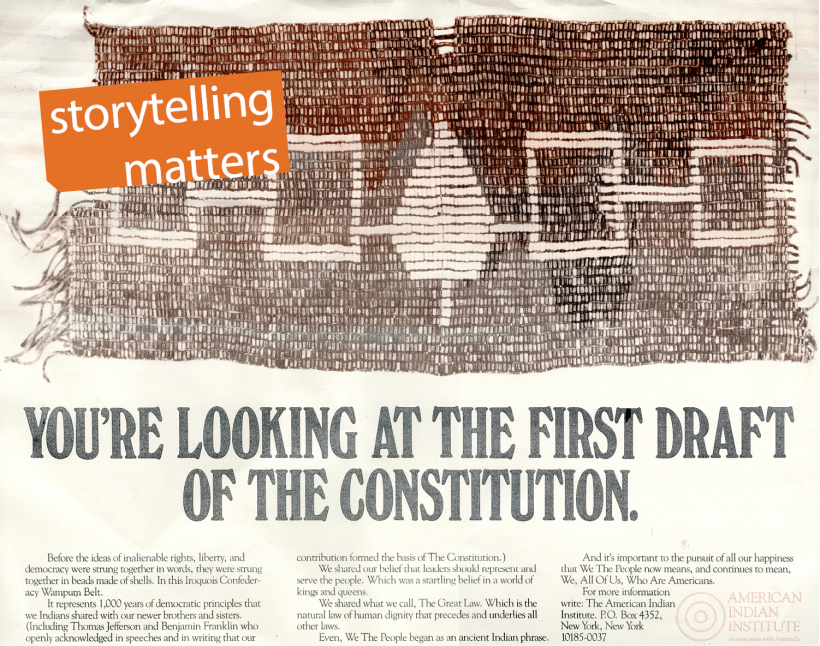Antecedent Technology
Don’t colonize our future
By: Amelia Winger-Bearskin
Reprinted From Immerse
It is said that those who fail to study history are doomed to repeat it. I would rephrase it: those who ignore data have underfitted models.
When Thomas Jefferson and Benjamin Franklin were looking for a new model to serve as a basis for the United States government, and they were very impressed by the Iroquois Confederacy (Hodenoshoune, People of the Longhouse, Made up of the Seneca, Cayuga, Oneida, Onondaga, Mohawk, Tuscarora). Thomas Jefferson spent a year with the Iroquois in upstate New York, in one of their large cities of a very sizable portion of the U.S. and Canada.
Later, when drafting the constitution, the founders cherry-picked the parts of Iroquois statecraft that best aligned with western Enlightenment-era ideology: representation, voting, checks and balances, etc. What they left out were the social and cultural networks that sustained these practices in the actual Iroquois Confederacy.
In the Iroquois constitution, women (clan-mothers) from each tribe were the only ones who could vote for the representative, who was always a man, a chief. There was a balance of power—only men could serve, only women could vote. Iroquois farming differed radically from the agricultural economy of European settlers, which was inextricably bound up with chattel slavery. In Iroquois society, everyone in the community participated in planting and harvesting.

The founders’ selective pilfering of Iroquois political practices is an example of a colonial mindset. I see it; I like it; I want it; I’ll take it. I take what will benefit my own political or material interests, but I’m unconcerned with the effect that it will have on the people I take it from.
What’s wrong with “colonizing” a concept? It’s not like a natural resource of a piece of land. Ideas are not a zero-sum game. We all have colonial mindset no matter who we are, just because our culture has a colonial mindset. No need to beat ourselves up over it though, right?
But taking an idea out of context is like plucking a plant out of its soil. You lose everything that made the thought work in the first place. What if it turns out that confederate democracy (or lasting peace and prosperity) is dependent upon a balance of power along gendered lines? Or upon a different economic model than the one practiced by European settlers in North America? Or requires a system of agriculture where the environment is protected and maintains sustainable practices?
In other words, the problem with colonial mindset is one of underfitting. It encourages us to believe we know more than we do, to premise our thinking on bad analogies. It is like trying to run a program without checking its dependencies — the program will produce weird artifacts, or crash completely, and we will be left holding the bag and scratching our heads.

For instance, let’s say you want to lay the groundwork for a society run on the blockchain. What would that look like? How would that work? What kind of consequences should we expect? Silicon Valley orthodoxy would have us move fast and break stuff. Wing it, basically, and hope we learn enough from our failures to make incremental improvements in the next release.
But we have thousands of years of data about decentralized economies. The use of Wampum among the Iroquois functioned as a decentralized, distributed ledger of contracts, and it helped us govern our society for centuries.
Wampum is an example of what I’ve termed “antecedent technologies” and there are many more cases like this. Antecedent technologies are techniques or systems that preceded European contact (or in Europe, ideas that preceded the Enlightenment). These old school technologists advanced sciences before the western world ‘invented’ the very same things. When cultures share and trade, they trade technology as well — but it is important to not conflate when they were invented with the first time a western person encountered it or remixed it.
The Incan knot-language of quipu, for instance has been shown to be Turing-complete, meaning the system is logically robust enough to support any computational operation with a modern programming language. Quipu inspires modern storytellers as well, an example is the expanded media documentary The Quipu Project.

When we want to use powerful new technologies such as artificial intelligence or blockchain, we want as much data as we can to help us imagine positive change in the world. We do not need to throw out thousands of years of data that can fuel the next giant leaps our communities will make with technology. To proceed forward with a colonial mindset is to colonize the future.
Our plans for the future need to include more data from diverse cultures and societies, and not only those ideas that can serve our narrow interests or flatter what we already believe. A future that includes us all must be grounded in a thorough understanding of where we already are, and where we have come from.
The foregoing is just a small dip into the concept of antecedent technologies. Over the next several months, I am embarking on a passion project looking at Wampum and its relationship to storytelling, our U.S. constitution, decentralized systems and our future beyond colonial mindset.
I’ve created a research framework to study antecedent technology, the first project of which is Wampum.codes. I’m working with other Seneca and Seneca-Cayuga women (I am Seneca-Cayuga Nation of Oklahoma, Deer Clan) to talk about our relationships with our traditional knowledge, the technologies we use to share our stories and how we hope to contribute to our community.
This project was inspired by the long conversations I had with Kamal Sinclair, Executive Director of the Guild of Future Architects, and Kat Cizek, director of the Co-Creation studio at MIT, when we were working together on Collective Wisdom. I am fortunate to have been selected as a Mozilla Fellow for 2019–2020 embedded at the MIT Co-Creation Studio, as their first fellow. I am hoping to take these conversations with my friends and collaborators and family in my tribe and add to the collective wisdom of my new cohort at Mozilla. To read more about other concepts using antecedent technologies check out Decentralized Storytelling. Always a special thanks for Eamon Abraham who is my writing coach and best friend.
wampum.codes will be live soo

